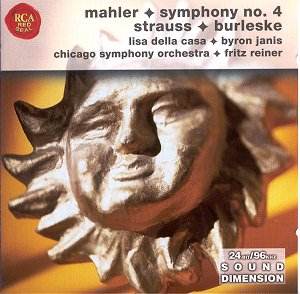Fritz Reiner was a close associate of both Strauss and
Bartók in both of whose music he excelled. He controlled
his Chicago Symphony Orchestra from 1953 to 1962 with a despotic
rod of iron. He was genuinely feared in a way in which he would
not have got away with today. He came to Chicago after spells in
Pittsburgh and at the New York Met.
His Chicago players shine in this recording of Mahler's Fourth.
There are some splendid solo spots among the winds and brass for
example. Reiner brings a subtle sense of detail to his interpretation,
always maintaining a grip on its architectural structure and the
progress of its ideas. The colourful scoring in this last of the
three so-called Wunderhorn symphonies is no better exemplified
than in the development section of the first movement. The forward
sound of the recording highlights all solos regardless of orchestral
placement. It really is an impressive technological transfer using
RCA's 24-bit/96kHz Sound Dimension to enhance the brilliance.
The Swiss soprano Lisa della Casa enjoyed a massively successful
career as an exponent of Mozart and Strauss. She does not always
sound at her best here, some soft floating top notes hinting at
unsupported tremolo (to describe it as a 'wobble' would be unfair).
Occasional adjustment of the focus of her pitch is clearly audible
- maybe modern technology has done her no favours here. But this
is a recording worth its weight in gold for the stylish Reiner
and the exemplary playing of the CSO.
The single-movement Strauss Burleske is not a work one hears
too often, and that is a matter of regret for it is a sparklingly
attractive piece. In his early twenties, and here predating the
tone poems, Strauss is at his most colourful and witty in music
which anticipates his Till Eulenspiegel. The Burleske was written
for the pianist Hans von Bülow, but dedicated to its first
performer Eugen d'Albert after Bülow found the piano part
unmanageable. No such problems for Janis, who plays it with suitable
panache and effortless control. Listen out for a hint of 'Somewhere'
from Bernstein's West Side Story, among all the Brahms and Liszt
that is.
Christopher Fifield
